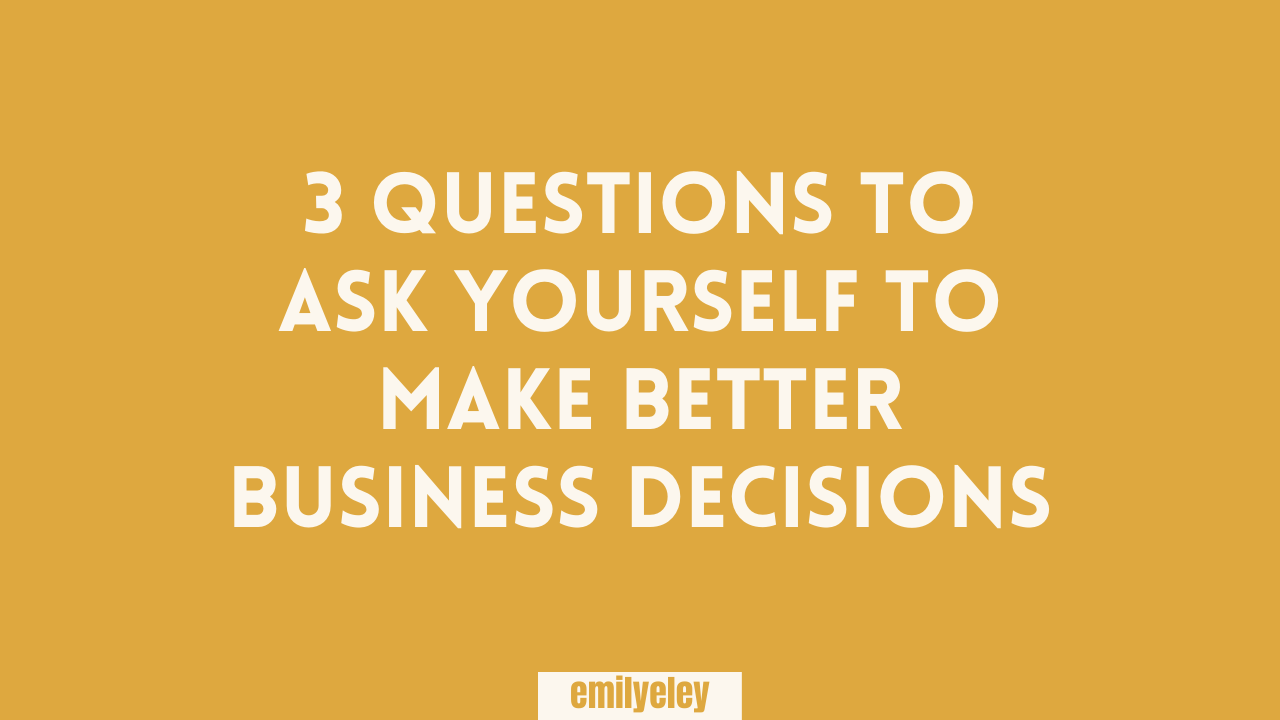3 Questions To Ask Yourself To Make Better Business Decisions
Jun 03, 2021
I’ve always had an easy time making decisions. I’m not a fan of grey area.
Whether it’s being the one to call the shots on where and when the group goes for dinner, knowing what I want out of a career, or choosing the next step on the path of my business, I’ve never been one to spend much time vacillating.
I like to know what’s next, I like to plan for it, and I can’t help but put my thoughts into action.
Sounds efficient, right?
But don’t be fooled. When it comes to efficiency, I used to think that being decisive was an important attribute for any business owner to have. While this is largely true, merely being decisive isn’t enough when it comes to growth, innovation, and general business maintenance.
All decisions have consequences, good or bad, and when choices are made for the sake of, well, being decisive and efficient (i.e. not thinking things thoroughly through), it’s easy to overlook the potential problems or roadblocks that are the results of our snap decisions.
Having a decision making process in place is imperative to making decisions that yield ideal outcomes.
Sure, my life probably won’t shift too drastically as a result of which restaurant I choose. But for higher-ticket decisions, like whether to make a new hire or deciding the next offer I want to build, I’ve come up with three questions to ask myself to make sure the decision I am making reaps maximum benefits.
1. Is this decision in alignment with my strengths?
Making business decisions that allow you to do more of what you are naturally good at is one of the best things you can do for the health and longevity of your company. (And pssst: taking the CliftonStrengths assessment and having a coach walk you through your results is a great place to start!)
Let’s say Activator is your number-one CliftonStrength. By definition, folx who are strong in this CliftonStrengths theme are great presenters and speakers.
So choosing to shift your business in a way that allows you to do more presenting and speaking will not only enable you to do more of what you are naturally good at, it will also give you more energy to tackle the parts of your business that are less exciting for you.
Making decisions that keep you in alignment with your strengths will leave you feeling fully charged by the work you’re doing, rather than drained by it.
It’s a win for you, and a win for your biz!
2. Is this decision in alignment with my core values?
When faced with high-stakes business decisions (when to launch your new offer, for example) using your core values as a moral compass can go a long way in ensuring the integrity of your business and by extension, your peace of mind.
Say one of your core values is flexibility. You value the ability to make changes to your schedule based on your changing needs and circumstances. You know that as an entrepreneur, it can be easy to fall victim to internalized capitalism and what is so often referred to as hustle culture, and you are committed to maintaining ample play and rest time.
Now imagine that your launch date is a week away. You still have about nine million things to do to feel ready, and you can tell that your team is feeling as burnt out as you are.
You’re faced with the decision to meet your launch deadline (pushing yourself and your team to the point of exhaustion and ignoring the fact that you have the flexibility to give yourself more time) or to delay the launch date by a week (honoring your needs and values).
By staying true to your core values, you are allowing yourself and your team the opportunity to restore energy and enthusiasm, and ultimately, you’re showing up more fully for yourself, your team, and your business.
3. Will this put me in a position where my business can grow?
Maintaining a growth mindset is key to sustained business success, and making decisions that foster this approach to entrepreneurship is vital to the sound evolution of your company.
Though asking yourself whether your decision will foster growth is relatively painless, the honest answer is often uncomfortable. Growth is uncomfortable, and almost always requires choosing the challenging path over the easy one.
Take hiring for example.
As a solopreneur, the easy path would be to not make a hire and continue juggling every aspect of your business on your own without the support of an employee. This is comfortable, because it’s what you know. But without help, your business will plateau and growth will become a fantasy.
The challenging path is to hire. It can be scary, expensive, risky, and certainly uncomfortable as a solopreneur. But by taking this uncomfortable step, you’re opening up possibilities for business growth that you wouldn’t otherwise have.
We hate SPAM. We will never sell your information, for any reason.


